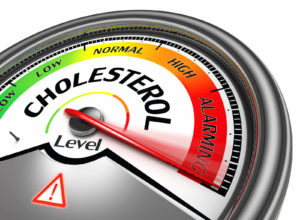Everyone knows that cholesterol is bad for the overall health of the body. High cholesterol levels can contribute to the development of atherosclerosis (the hardening and narrowing of the arteries) which makes a person more likely to suffer a heart attack or a stroke.
It’s so extremely important to keep cholesterol levels down to help prevent heart disease. But, did you know that high cholesterol can also contribute to cataracts and other eye issues?
Cholesterol
 There are a few things that contribute to the amount of cholesterol in your system. Most people think poor diet is the only way cholesterol gets into your system. But the truth is, cholesterol is actually manufactured naturally in your body. Your liver produces all the cholesterol your body needs.
There are a few things that contribute to the amount of cholesterol in your system. Most people think poor diet is the only way cholesterol gets into your system. But the truth is, cholesterol is actually manufactured naturally in your body. Your liver produces all the cholesterol your body needs.
Most people consume more cholesterol than their body needs which leads to high cholesterol levels in their body. Some people have a predisposition to high cholesterol levels because of a family history. It can also be the result of being overweight or not being physically active.
Cataracts
Cataracts are a clouding of the lens of the eye. They impair the vision because they don’t allow light to pass through the lens the way it should.
There are a few things people do to increase their risk of developing cataracts:
- Expose their eyes to ultraviolet light without protection (proper sunglasses)
- Smoke
- Have high blood sugar
- Have high blood pressure
- Use steroid medications
Is cholesterol a contributing factor in the development of cataracts? Maybe not directly, but medications used to control it have been linked to an increased risk of cataracts.
Cholesterol Cataract Connection
Although some people believe there is a direct connection between cholesterol and cataracts, it seems to be less of a direct threat and more of an indirect one. It is an indirect threat by two means – an unhealthy diet and the medicine used to lower high cholesterol.
A healthy diet is an important to all body functions. This includes your eyesight. A diet that is high in cholesterol is not healthy. If a person is eating a diet rich in vitamins and minerals and low in fat, they are less likely to develop food related health issues.
When it comes to taking care of your body and eyes, consider reducing the amount of high cholesterol, fat and sugar items in your menu. There are a number of foods containing the essential vitamins, minerals and nutrients for improving eye health and vision.
Also consider adding a vitamin supplement, like our Ocu-Plus Formula, to your diet to improve not only the health of your body, but the health of your eyes. Remember that having high blood sugar and high blood pressure (which can both be controlled through proper diet) are both contributing factors to the development of cataracts.
The second connection between cholesterol and cataracts comes from the medicines that are commonly prescribed to lower cholesterol, statins. Statins work by clearing cholesterol from the blood. There have been several studies to assess the increased risk of cataracts among statin users.
One study was conducted by Ishak Mansi, MD of the VA North Texas Health System at the University of Texas Southwestern in Dallas. Here, the researchers found that statin users were nine percent more likely to suffer from cataracts than non-statin users. Other studies have found an increased risk of up to 57 percent.
Doctors and researchers are working on creating a cholesterol lowering drug that will not put your eyesight at risk. If you are at risk of high cholesterol because of family history, physical inactivity, or poor diet, consider what you can do to lower your risk of needing a statin prescribed to you.
Improve your diet to include healthier choices by cutting out high fat foods such as fast food and increase your intake of fruits and vegetables. Get physically active by getting up and moving. The more you move, the easier it becomes. Although we can’t change our family history, we can choose to live the healthiest life possible, making your family history less of an influence.
Eye Damage Caused by High Cholesterol
One of the ways cholesterol can damage your eyesight is if the cholesterol breaks free from build up in the arteries and goes into the bloodstream. It can then clog up the retina’s arteries. This would result in retinal artery occlusion. It can also cause macular degeneration because the buildup of cholesterol in the macular vessel can slow down the amount of blood flow getting to the eyes.
Don’t wait until it’s too late. Start making changes in your lifestyle and daily routine now to prevent high cholesterol and vision damaging risks. It’s so easy to make healthy, natural changes, like adding the right foods to your diet and exercising. A little motivation and dedication can go a long way in the battle to maintain a healthy life and healthy eyes!
The post Is There a Connection Between Cholesterol and Cataracts? appeared first on Natural Vision Improvement - Eye Exercises & Eye Vitamins.














